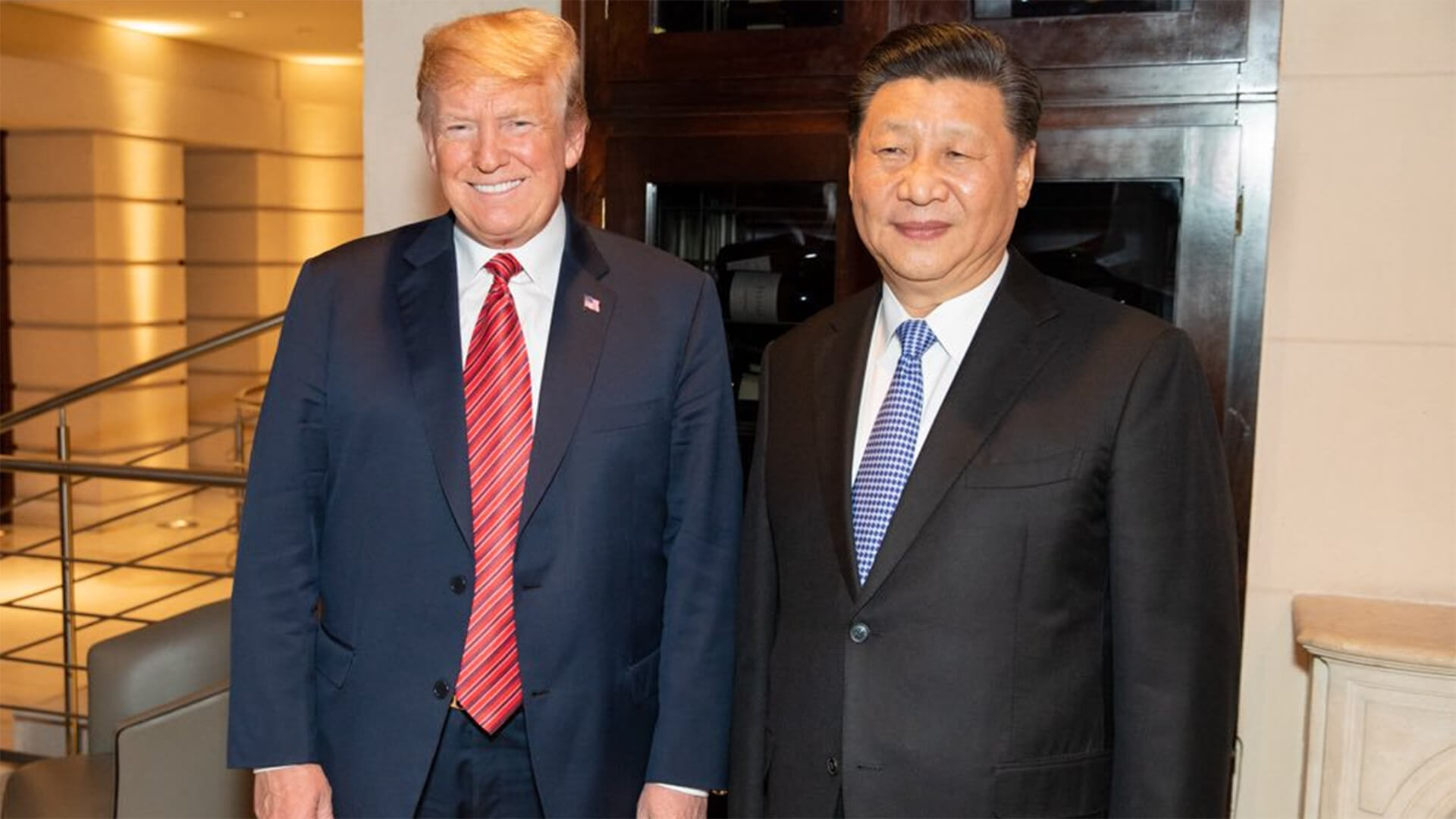Peter Zeihan here. It’s Easter Monday. You’ll see this on Easter Tuesday. And today we have to talk about the Department of Defense and in particular, the Secretary of Defense. A guy by the name of Pete Hegseth. Pete Hegseth is the least qualified, most incompetent secretary of defense the United States has had. And over the couple of months that he has been in the office, he has done more to destroy the United States’ capacity to fight a current war, much less a future war, than really anyone in American history.
And it’s worth exploring why. The big news that came out over Easter weekend that has prompted me to talk about this topic is that if you remember back a few weeks ago, we had the SignalGate issue where the Secretary of Defense, Hegseth, set up a chat room with a bunch of other top national security folks, as well as the Treasury Secretary.
And somehow a reporter got invited onto it, and on an unsecured platform that the Russians had cracked the security on, started discussing active war plans and operational intelligence—something that under normal circumstances would have gotten everyone involved fired. But this is the Trump administration, and decisions are made differently these days. Anyway, turns out that around the same time that he did that, Hegseth had another single chat—again unsecured—but this time with personal friends, his personal lawyer, his wife, no one who had a security clearance.
And to be clear, this is a felony that would get anyone in the armed forces put away forever and dishonorably discharged in a matter of seconds. The Trump administration has already said they see nothing wrong with this, and Hegseth will continue in his position. I think it’s worth understanding why the United States military is the most powerful military force in human history, and how Hegseth is looking to rip that up, root and branch.
The first issue is education. When you have a force that spans the globe, you will need dozens of different skill sets, especially in your officer corps. So the United States maintains the most advanced staffed college system in human history to train up their mid-career officers for any possible outcome, as well as to teach them things like history, economics, trade, technology, electricity, energy, and all the rest.
One of the things that Hegseth has said is that anything that does not directly encourage activities for an active war fighter should be cut. That includes all of the staff colleges, which is where we get all of our officers. Basically, it’s a return—or an attempt to return—the training system to something that was much more reminiscent of what we had in the Civil War, where you just threw bodies at everything.
Gone would be the efforts of leveraging technology or anything else. The second issue is these educational institutions that we have to keep in mind: globe-spanning military force. So we do two things. Number one, we fly the troops to the educators. We try to fly the educators to the troops based on the circumstances. In addition, there’s the little issue of allies. Because the United States has the best training system in the world, we kind of lend it out, if you will. We invite other war fighters from allied countries to come to our training institutions to basically get a doctorate in the American way of warfighting, as well as seal up alliances and potential alliances with countries that are not, yes, treaty allies. Well, that requires people moving about.
And one of the things that Hegseth has done is a blanket travel ban on all the educators so that they can’t travel. So if you want a war fighter to get trained, he now absolutely has to come to where the university happens to be, whether that’s in Annapolis or in Monterey. And everyone else is just shit out of luck.
So we’ve seen what is arguably, in my opinion, the single biggest advantage we have long-term whittled down to just a weak spot. Then there’s technology. You may have noticed, but since the age of computers, the type of hardware that we are using in the world has been evolving, especially in the last few years with the Ukraine war.
So, for example, the military gets a lot of crap, I think, fairly or unfairly, for being kind of stodgy because the technologies that they have used really haven’t evolved or mutated a lot in the last hundred years. I mean, yeah, yeah, yeah, we got jets after World War Two or at the end of World War Two. We got tanks at the end of World War One. We developed missiles during the Cold War. But guns, artillery, missiles, jets, helicopters, ships—you know, the general playbook hasn’t evolved all that much. The same basic platforms haven’t evolved. We just upgrade specific technologies and put them together in different packages and throw them at different problems in different ways.
But the pieces really haven’t changed all that much. Well, starting about five, ten years ago, that really started to shift because we got breakthroughs in things like information technology and energy transfer and digitization, and they’re all happening at the same time, and they’re combining into new weapons systems that we’re only now starting to game out and design. And the Ukraine war is famous, of course, for drones.
And drones are absolutely the leading edge of this revolution. But we don’t know what this is going to look like in five years or ten years or 15 years or 30 years. And keep in mind that we have a lot of weapon platforms that we designed back in the ’50s that we’re still using. So you have to have an institution within the military that games out the future.
This takes two forms. First, you get the best and the brightest from the Intel systems within the military. You put them together in a room and get them to imagine the sort of thing that the president is going to be demanding of the military forces in ten, twenty, forty, eighty years. Then you need a technical team that can design a weapons system that will not just be useful ten and twenty years from now but can be upgraded and still be used a generation or two from now.
Well, Hegseth is firing all of those people. The Office of Net Assessment—whose job it is to do the first part of that, imagine the future—has already been disbanded, and we’re seeing massive cutbacks in excess of 70% for all the officers that do the technical work. So basically, the United States is taking a giant technological step backward in its warfighting under Hegseth.
And then the third issue is recruitment. Remember, we don’t know what the weapons of the future are going to be. So why in the world would you put any restrictions on how someone might choose to serve their country? We need everyone of every background. And if you look back at the history of the U.S. military going all the way back to before the Civil War, it’s not just that the military has always been a social ladder for underprivileged groups to attain status within a society.
It’s a way they can attain leadership. They can get the skills that they need to remake their own futures. And from the American point of view, from the military point of view, from the tactical point of view, from the warfighter point of view—we need everyone we can get. Newsflash, folks: straight white dudes are less than one third of the population.
And if you put restrictions on how the other two thirds of the population can choose to serve the country, you will never meet your recruitment goals. So in the last two months, we’ve seen a series of things go down. Most notably, Hegseth recently changed the physical requirements for what you have to match in order to serve in the military.
Gold review phraseology—a policy that almost seems like it was custom-designed to kick all women out of the U.S. military. And then, of course, recruitment for any place that is not totally stocked with white dudes has basically been cut to zero. Even Black engineering universities are no longer being visited. And I know, I know, some people are going to say, well, if you’ve got a standard and everyone can’t meet it, it doesn’t work.
No, no, no, no, no. The Israelis broke the seal on women in the military over 50 years ago. And today, every first-world military has a substantial proportion of women in the field. So if you can’t adjust for that, you’re going back to the 1840s. Moreover, there are some jobs—like, say, fighter pilots—where women are better because they can handle the G-forces better.
So is Hegseth going to change the policy so only chicks are fighting in the jets? I don’t think so. What we’re seeing is it’s all adding up to the greatest degradation of American warfighting potential that we have ever seen. And this is only two months in. I also don’t think this is the end of it. Yes, Hegseth has now committed multiple felonies.
Yes, Hegseth is an unmitigated disaster in his leadership. And yes, his entire inner office has now been fired. Oh, this is rich—he fired everybody in his office saying that they were all leaking information. I have no idea if that is true, but Hegseth has a history—especially in the SignalGate stuff—of saying something that is just a bald-faced lie, knowing that the information is out there to prove him wrong.
And it’s usually released in the next couple of days. So by the time we see this video, we will probably have multiple lawsuits against Hegseth personally, for people firing, quitting, etc. So by the time you see this video, it’s entirely possible that the office that was fired—they will have all issued wrongful termination lawsuits and provided the information that will prove this guy is just an absolute moron.
Okay. Do I think he’s going to go? No. Remember, the Trump administration did not build its cabinet because it thought these people were capable or change agents. He chose them because they were incompetent. The first time around, when Donald Trump became president, he really didn’t expect it. He thought he was going to lose to Hillary Clinton. And so he didn’t have a cadre of people around him because he had never been in government.
Well, he reached into the Republican Party, pulled their policy experts, and—especially on security affairs—relied very heavily on generals and admirals to fill out the billets. Well, what he discovered in that environment is when you have generals and admirals who have been through the staff training program and they know how the world works intimately, they have opinions about how things should be done, and they can point out consequences if you do things the wrong way.
Well, whenever that happened, Trump fired them. And so he went through more cabinet members than any American president in history. Just a huge number of generals rotated through the White House in positions like, say, Secretary of Defense or CIA Director. Fast forward to this most recent race.
Trump had decided while he was out of power that rather than build a team of competent people who could push an agenda through, he wanted to make sure that there was never anyone in the room who would tell him no. So he reached out and hired people like Pete Hegseth, who I would argue three months before he became Secretary of Defense, had no idea that that was in his future.
Well, because Trump values incompetence near him, there is no reason to expect Hegseth to be dismissed. I mean, of course he should be dismissed. But of course, in a normal administration, he would have never been nominated, much less confirmed. And that brings us to the next problem: Hegseth and people who are at his level of general incompetence—that includes the Director of National Intelligence, who is Tulsi Gabbard, or the Health and Human Services Secretary, who is Robert Kennedy Jr.
All of these people should not be in their spots, but they’re going to stay because Trump values their lack of expertise. He values their yes-man mentality. He values the fact that they’re not keeping him informed because it allows him to live in his hermetically sealed, Obama-esque bubble. The only way that these people can go away is if they are impeached.
And since the Trump team has basically gutted the Senate of anyone who is willing to stand out, that’s a really tall order. As Senator Murkowski of Alaska pointed out, retaliation against Trump is real. And so she’s considering leaving the party and being an independent in her home state of Alaska. That would still leave us with 52 Republican senators who are either unwilling or unable to stand against the president on issues of national security.
And if you’re going to impeach someone, you have to get two thirds of both houses of Congress. So now you’re talking about roughly 20 Republican senators having to flip. In this political environment, I just don’t see that as feasible. So we are looking into the long, painful, drawn-out crash of the United States’ ability to manage its national security concerns under a leadership that is thin, that is broken, that is incompetent—and unfortunately, that we are stuck with for the foreseeable future.











